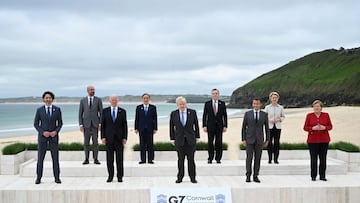G-7 Summit: When will changes be made to the corporate tax rate and what has Biden said about it?
The G-7 met in person for the first time in over a year…One of the biggest topics up for discussion -- a tax minimum for multinational corporations.


The G-7 is an inter-governmental political forum consisting of seven of the most powerful countries on the global stage.
The meeting of key leaders, hosted by the United Kingdom, took place this week. The meeting dubbed, the Cornwall Summit is the first to take place in person since the pandemic began last year. Ahead of the event, the UK, released four policy priorities for the meeting, including how their nations could steward the global recovery from the pandemic, promote free and fair trade, combat climate change, and foster global collaboration based on the groups “shared values.”
Sat down with @BorisJohnson at the @G7 to go over our shared priorities - like creating jobs, the economic recovery, delivering vaccines worldwide, advancing gender equality, taking climate action - and what we can do together to make progress on them. https://t.co/WbFSNvTqow pic.twitter.com/3tSWrzzvT1
— Justin Trudeau (@JustinTrudeau) June 11, 2021
What did the G-7 decide as should be the minimum corporate tax rate for their countries?
The Finance ministers and leaders from the seven countries took part in the discussions and agreed that their nations should implement a corporate tax rate of at least fifteen percent. Additionally, the group agreed that taxation should be based on where multinational corporations are operating and making profits to ensure that the most profitable global companies pay their fair share. The exact details of how this change will be implemented will be released in the G-7 communique describing the decisions made at the event.
Many countries around the world, allow corporations that operate within their borders to file their corporate status in a country where the tax burden is smaller. This deprives governments of billions in what could have been taxable income. The change will ensure that regardless of if a corporation has a headquarters in a country, they pay a price to operate there.
While this may help increases tax revenue in high-income countries few details have been released on how it would benefit poorer countries. It has been well document that the fashion industry and many other sectors outsource manufacturing to countries with cheaper and less regulated labor markets. Some companies argue that contacting in-country suppliers helps to build more cost-effective supply chains, but there are many other benefits for multinational companies. One major benefit is that it shifts the responsibility of paying fair wages and ensuring safe working conditions to other organizations. The G-7 should work to guarantee that companies who rely on infrastructure, human capital, and other public goods pay countries they operate in fairly.
What has the White House said about the changes to global corporate taxation?
The White House described the move as a “critical step towards ending the decades-long race to the bottom that pushes nations to compete over who can offer the lowest tax rate to large corporations at the expense of protecting workers, investing in infrastructure, and growing the middle class."
However, the White House has yet to release details on whether the minimum corporate tax rate is impacted by federal tax subsidies and credit. For years, Amazon, one of the most profitable companies in the United States paid zero dollars in federal income tax. These benefits were so generous that in 2018, Amazon received a tax rebate from the federal government worth $129 million.
What other topics were discussed?
Related stories
Fighting and preparing future pandemics was a major point of discussion between the leaders, some of whom, have spent over a year guiding their nations through one of the most challenging crises in modern history. The discussions focused on global vaccine distribution efforts and the sending of medical supplies to countries in need. Earlier this week, the US announced that it would be donating 500 million Pfizer BioNTech vaccine doses to COVAX. This represents half of the doses the G-7 has pledged to donate together. COVAX, the global vaccine distribution program, is set to begin administering doses in August 2021.
G7 to Donate 1 Billion Vaccine Doses to Poorer Nations https://t.co/3X6DvlKGEZ
— Democracy Now! (@democracynow) June 12, 2021
The leaders also met with pandemic experts such as Patrick Vallance, Chair of the International Pandemic Preparedness Partnership and Co-Chair and Founder of the Bill & Melinda Gates Foundation Melinda Gates. During this meeting, the group discussed how they could best support the global effort to combat and prevent future pandemics.
- Tax on wealth and large fortunes
- Covid-19 economic crisis
- G-7
- Corporate tax
- Science
- Coronavirus Covid-19
- Economic crisis
- Pandemic
- Coronavirus
- Recession
- Taxes
- Economic climate
- Virology
- Outbreak
- Infectious diseases
- Tributes
- Diseases
- Microbiology
- Public finances
- Medicine
- International organisations
- Economy
- Foreign relations
- Biology
- Health
- Finances
- Life sciences

